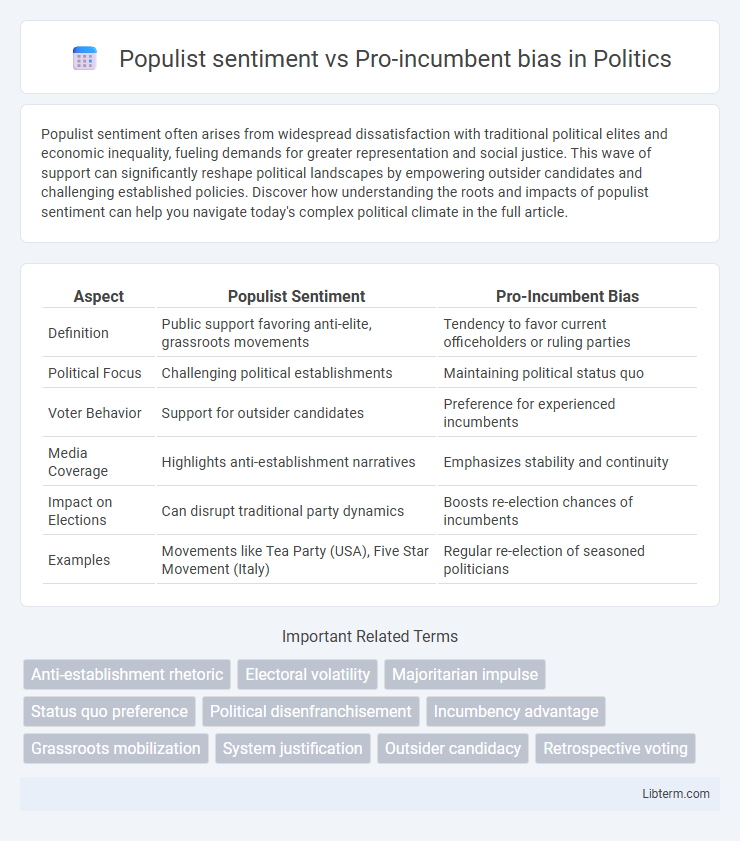Populist sentiment often arises from widespread dissatisfaction with traditional political elites and economic inequality, fueling demands for greater representation and social justice. This wave of support can significantly reshape political landscapes by empowering outsider candidates and challenging established policies. Discover how understanding the roots and impacts of populist sentiment can help you navigate today's complex political climate in the full article.
Table of Comparison
| Aspect | Populist Sentiment | Pro-Incumbent Bias |
|---|---|---|
| Definition | Public support favoring anti-elite, grassroots movements | Tendency to favor current officeholders or ruling parties |
| Political Focus | Challenging political establishments | Maintaining political status quo |
| Voter Behavior | Support for outsider candidates | Preference for experienced incumbents |
| Media Coverage | Highlights anti-establishment narratives | Emphasizes stability and continuity |
| Impact on Elections | Can disrupt traditional party dynamics | Boosts re-election chances of incumbents |
| Examples | Movements like Tea Party (USA), Five Star Movement (Italy) | Regular re-election of seasoned politicians |
Understanding Populist Sentiment: Definition and Origins
Populist sentiment refers to a political attitude that favors the interests of ordinary people over established elites, often characterized by skepticism towards institutional authority and claims of widespread corruption. This sentiment arises from socio-economic disparities, cultural anxieties, and perceived failures of traditional political systems to address public needs. Understanding populist sentiment involves analyzing its roots in economic inequality, political disenfranchisement, and cultural identity conflicts that motivate mass support for anti-establishment movements.
What Drives Pro-incumbent Bias in Modern Politics
Pro-incumbent bias in modern politics is driven by voters' preference for stability, perceived experience, and existing political networks that provide tangible benefits. Economic performance and policy outcomes under current leadership reinforce this bias, as positive evaluations of incumbents' effectiveness reduce the appeal of populist alternatives. Furthermore, media framing and information asymmetry often bolster incumbents by shaping public perception through selective exposure and agenda-setting.
Key Differences Between Populism and Incumbency Advantage
Populist sentiment emphasizes anti-establishment rhetoric and mass mobilization against perceived elite control, often fueled by disenchantment and calls for political change. In contrast, pro-incumbent bias reflects voters' tendency to favor current officeholders due to name recognition, past performance, and institutional advantages such as campaign resources. While populism challenges the status quo with outsider appeal, incumbency advantage relies on established political capital and stability in electoral support.
Historical Case Studies: Populism Versus Incumbent Power
Historical case studies reveal the complex dynamics between populist sentiment and pro-incumbent bias, highlighting episodes such as the rise of Andrew Jackson in the 1820s United States, where widespread distrust of entrenched elites fueled populist movements challenging incumbent authorities. In early 20th century Europe, the Weimar Republic experienced competing pressures from populist parties against established political institutions, demonstrating how populism exploits public dissatisfaction to erode pro-incumbent bias. These cases underscore the variable strength of populist waves in overturning or reinforcing incumbent power depending on political, social, and economic contexts.
Social Media’s Role in Amplifying Populist Sentiment
Social media platforms significantly amplify populist sentiment by facilitating rapid dissemination of emotionally charged and polarizing content, which resonates strongly with disaffected populations seeking simplified narratives and direct engagement with political figures. Algorithms prioritize sensational and controversial posts, increasing exposure to populist rhetoric while diminishing nuanced policy discussions, thereby reinforcing echo chambers and confirmation biases. This digital environment often undermines pro-incumbent bias by fostering distrust in traditional institutions and incumbents, fueling support for outsider candidates and anti-establishment movements.
How Economic Factors Shape Populist and Incumbent Support
Economic factors significantly influence populist sentiment and pro-incumbent bias, with high unemployment and income inequality driving support for populist candidates who promise radical change. In contrast, stable economic growth and rising living standards tend to reinforce pro-incumbent bias by increasing voter satisfaction with current leadership. Inflation rates and wage stagnation also play crucial roles, as economic distress fuels anti-establishment attitudes, while fiscal stability bolsters confidence in incumbents.
The Impact of Political Institutions on Voter Bias
Political institutions shape voter bias by influencing the balance between populist sentiment and pro-incumbent bias. Electoral systems, party structures, and judicial independence determine how voters perceive legitimacy and whether they favor anti-establishment candidates or the status quo. Studies show that proportional representation systems tend to reduce pro-incumbent bias by empowering diverse voices, while majoritarian frameworks often reinforce support for incumbents due to strategic voting incentives.
Media Narratives: Shaping Public Perception of Populists and Incumbents
Media narratives play a crucial role in shaping public perception by often amplifying populist sentiment through sensationalized coverage that highlights anti-establishment rhetoric and charismatic leaders. Simultaneously, pro-incumbent bias emerges in media systems with vested interests or regulatory frameworks favoring stability and continuity, leading to disproportionate visibility and favorable framing of incumbent politicians. This dynamic influences voter attitudes by creating contrasting portrayals where populists are depicted as radical challengers and incumbents as reliable stewards, thereby affecting electoral outcomes and democratic engagement.
Electoral Consequences: Outcomes in Populist vs. Pro-incumbent Elections
Populist sentiment often leads to electoral outcomes characterized by anti-establishment candidates gaining significant support, disrupting traditional party systems and resulting in unpredictable policy shifts. In contrast, pro-incumbent bias tends to reinforce existing power structures, facilitating the re-election of sitting officials and promoting policy continuity. These dynamics influence voter turnout, campaign strategies, and the overall stability of democratic institutions during election cycles.
Future Trends: Navigating Populist Sentiment and Incumbent Loyalty
Future trends indicate a complex interplay between populist sentiment and pro-incumbent bias, with voter behavior increasingly influenced by economic uncertainty and media narratives. Electoral studies reveal that while populist movements gain traction in periods of social unrest, incumbent loyalty often strengthens due to perceived stability and policy continuity. Political strategists must leverage data analytics to balance messaging that addresses anti-establishment appeals without alienating core supporters favoring governance experience and institutional trust.
Populist sentiment Infographic

 libterm.com
libterm.com